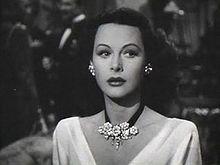Hedy Lamarr (Actress/Inventor)
 Hedy Lamarr (November 9, 1913 – January 19, 2000) was an Austrian-born American actress of Jewish descent.
Hedy Lamarr (November 9, 1913 – January 19, 2000) was an Austrian-born American actress of Jewish descent.
Though known primarily for her film career as a major contract star of MGM's "Golden Age", she also co-invented an early technique for spread spectrum communications, a key to many forms of wireless communication.
Lamarr was born Hedwig Eva Maria Kiesler in Vienna, Austria-Hungary, to Jewish parents Gertrud (née Lichtwitz), a pianist and Budapest native who came from the "Jewish haute bourgeoisie", and Lemberg-born Emil Kiesler, a successful bank director. She studied ballet and piano at age 10.
When she worked with Max Reinhardt in Berlin, he called her the "most beautiful woman in Europe". Soon the teenage girl played major roles in German movies, alongside stars like Heinz Rühmann and Hans Moser.
In early 1933 she starred in Gustav Machatý's notorious film Ecstasy, a Czechoslovak film made in Prague, in which she played the love-hungry young wife of an indifferent old husband. Closeups of her face and long shots of her running nude through the woods gave the film notoriety.
On 10 August 1933 she married Friedrich Mandl, a Vienna-based arms manufacturer 13 years her senior. In her autobiography Ecstasy and Me, Lamarr described Mandl as an extremely controlling man who sometimes tried to keep her shut up in their mansion. The Austrian bought as many copies of Ecstasy as he could possibly find, objecting to her in the film, and "the expression on her face". (Lamarr later claimed the looks of passion were the result of the director poking her in the bottom with a safety pin.)
Mandl prevented her from pursuing her acting career, and instead took her to meetings with technicians and business partners. In these meetings, the mathematically talented Lamarr learned about military technology. Otherwise she had to stay at the castle Schloss Schwarzenau. She later related that, even though Mandl was part-Jewish, he was consorting with Nazi industrialists, which infuriated her.
In Ecstasy and Me, Lamarr wrote that dictators Benito Mussolini and Adolf Hitler both attended Mandl's grand parties. She related that in 1937 she disguised herself as one of her maids and fled to Paris, where she obtained a divorce, and then moved on to London. According to another version of the episode, she persuaded Mandl to allow her to attend a party wearing all her expensive jewelry, later drugged him with the help of her maid, and made her escape out of the country with the jewelry.
First she went to Paris, then met Louis B. Mayer in London. After he hired her, at his insistence, she changed her name to Hedy Lamarr, choosing the surname in homage to a beautiful film star of the silent era, Barbara La Marr, who had died in 1926 from a drug overdose.
In Hollywood, she was usually cast as glamorous and seductive. Her American debut was in Algiers (1938). Her many films include Boom Town (1940), White Cargo (1942), and Tortilla Flat (1942), based on the novel by John Steinbeck. White Cargo, one of Lamarr's biggest hits at MGM, contains arguably her most famous film quote, "I am Tondelayo". In 1941, she was cast alongside two other Hollywood beauties, Lana Turner and Judy Garland in the musical extravaganza Ziegfeld Girl.
She made 18 films from 1940 to 1949 even though she had two children during that time (in 1945 and 1947). She left MGM in 1945; Lamarr enjoyed her biggest success as Delilah in Cecil B. DeMille's Samson and Delilah, the highest-grossing film of 1949, with Victor Mature as the Biblical strongman. However, following her comedic turn opposite Bob Hope in My Favorite Spy (1951), her career went into decline.
She appeared only sporadically in films after 1950, one of her last roles being that of Joan of Arc in Irwin Allen's critically panned epic The Story of Mankind (1957). The publication of her autobiography Ecstasy and Me (1967) took place about a year after accusations of shoplifting, and a year after Andy Warhol's short film Hedy (1966), also known as The Shoplifter. The controversy surrounding the shoplifting charges coincided with a failed return to the screen in Picture Mommy Dead (1966). The role was ultimately filled by Zsa Zsa Gabor.
Related Links:
Hedy Lamarr on Wikipedia
Hedy Lamarr Official Website